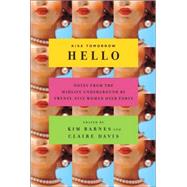
KIM BARNES is the author of In the Wilderness, which won the PEN/Jerard Fund Award and was a finalist for the 1997 Pulitzer Prize. She teaches at the University of Idaho. CLAIRE DAVIS lives in Lewiston, Idaho, where she teaches writing at Lewis-Clark State College. Her first novel, Winter Range, received the MPBA and PNBA awards and her work has appeared in The Pushcart Prize Anthology and Best American Short Stories. Davis's second novel, Season of the Snake, was released in 2005 to critical acclaim, and her collection of stories, Labors of the Heart, is forthcoming from St. Martin's Press.
| Introduction | 1 | (10) | |||
|
|||||
|
11 | (14) | |||
|
|||||
|
25 | (7) | |||
|
|||||
|
32 | (14) | |||
|
|||||
|
46 | (8) | |||
|
|||||
|
54 | (6) | |||
|
|||||
|
60 | (13) | |||
|
|||||
|
|||||
|
73 | (15) | |||
|
|||||
|
88 | (9) | |||
|
|||||
|
97 | (11) | |||
|
|||||
|
108 | (8) | |||
|
|||||
|
116 | (9) | |||
|
|||||
|
125 | (10) | |||
|
|||||
|
135 | (18) | |||
|
|||||
|
|||||
|
153 | (13) | |||
|
|||||
|
166 | (17) | |||
|
|||||
|
183 | (20) | |||
|
|||||
|
203 | (15) | |||
|
|||||
|
218 | (15) | |||
|
|||||
|
|||||
|
233 | (11) | |||
|
|||||
|
244 | (15) | |||
|
|||||
|
259 | (11) | |||
|
|||||
|
270 | (21) | |||
|
|||||
|
291 | (13) | |||
|
|||||
|
304 | (7) | |||
|
|||||
|
311 | (14) | |||
|
|||||
| Contributors | 325 | (8) | |||
| The Editors | 333 | (2) | |||
| Acknowledgments | 335 |
The New copy of this book will include any supplemental materials advertised. Please check the title of the book to determine if it should include any access cards, study guides, lab manuals, CDs, etc.
The Used, Rental and eBook copies of this book are not guaranteed to include any supplemental materials. Typically, only the book itself is included. This is true even if the title states it includes any access cards, study guides, lab manuals, CDs, etc.
Excerpted from Kiss Tomorrow Hello: Notes from the Midlife Underground by Twenty-Five Women over Forty by Claire Davis, Kim Barnes
All rights reserved by the original copyright owners. Excerpts are provided for display purposes only and may not be reproduced, reprinted or distributed without the written permission of the publisher.